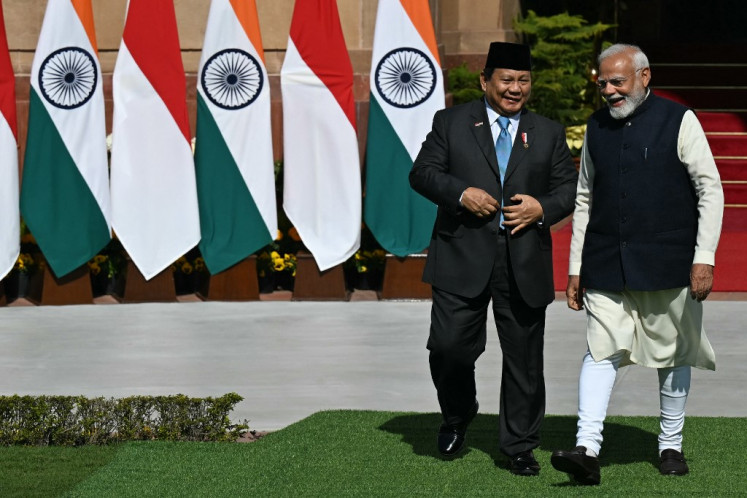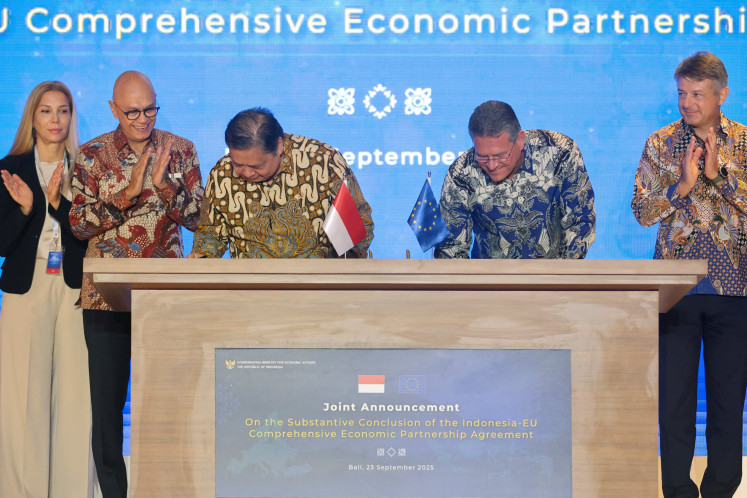Popular Reads
Top Results
Can't find what you're looking for?
View all search resultsPopular Reads
Top Results
Can't find what you're looking for?
View all search resultsBribery: In between relativism and absolutism
The recent arrest of Regional Representatives Council (DPD) speaker Irman Gusman for alleged bribery has no doubt tainted the image of the state body that many liken to the senate in the US.
Change text size
Gift Premium Articles
to Anyone
T
he recent arrest of Regional Representatives Council (DPD) speaker Irman Gusman for alleged bribery has no doubt tainted the image of the state body that many liken to the senate in the US.
Irman was later named a suspect in the case and, as a consequence, he was relieved from his position as the DPD leader. Interestingly, prior to his arrest, Irman had been seen in public staunchly supporting
anticorruption reforms in Indonesia, including the adoption of the death penalty as a deterrent.
The scandal surrounding Irman has once again reminded the public of prominent figures known for their anticorruption commitment who have ended up being part of the corruption problem in Indonesia.
Generally defined as the offering or giving of something in order to influence a public official in discharging his or her duties and responsibilities, many believe that bribery exists in a country due to the existence of the associated supply and demand represented by people willing to pay bribes and those willing to accept them in exchange for their “services”.
Understanding the mechanics and dynamics of both sides of bribery is deemed important to design the most appropriate intervention measures in a country.
In Indonesia, based on Corruption Eradication Commission (KPK) statistics, around 51 percent of corruption cases investigated by the commission involved bribery, which also represented a high supply and demand of bribery in the country.
Based on a global survey by Ernst & Young in 2012, 60 percent of Indonesian respondents viewed making cash payments to win new business as an acceptable practice. Additionally, 40 percent of Indonesian respondents believed that providing entertainment to win or retain business was also acceptable conduct.
A more recent global survey by Ernst & Young, its 14th Global Fraud Survey ( 2016 ), found that
76 percent of Indonesian respondents believed that actions such as applying more flexible product return policies, changing assumptions determining valuations/reserves, extending monthly reporting periods, backdating contracts and the early booking of revenues were justifiable.
Bribery is a violation of the anticorruption law. However, many scholars believe that the fact that the act of graft remains pervasive, despite the numerous cases uncovered by law enforcers, is because there is more to bribery than meets the eye.
Some suggest that in addition to economic factors, cultural factors also support the high prevalence of bribery in society.
Multiple perspectives used by anticorruption scholars in viewing and discussing the bribery problem include the “structural perspective” (viewing human behavior as structured in nature, usually focusing on strengthening rules and regulations), “socio-normative perspective” (focusing on society’s accepted norms) and “organizational-normative” perspective (focusing on the link between organizational norms and corruption).
Discussing bribery from an ethical point of view often leads to revealing what many experts dub as the relativism of corruption, where the right and wrong of a graft act depends on the context that people use to judge it.
For example, whereas some people who support absolutism in ethics believe that all actions must be consistent with moral principles, others who favor the exceptionism view of ethics believe that exceptions can be made in some cases, including those of bribery (e.g. surviving financial pressure). With regard to such exceptions, some also believe that when corrupt acts can produce benefit for most, if not all, people then they can be justified (situationism view).
Generally, when debating whether or not paying or accepting bribery is ethically wrong, an individual will often judge it based on his or her ethical position.
Studies suggest that one’s ethical view is largely affected by the shared norm, values and beliefs (i.e. culture) of the society or the group he or she belongs to.
Those who are strongly against all forms of corruption are often those who take the view of absolutism, by which they always believe corrupt acts are ethically wrong. On the other hand, those who explicitly or implicitly support the views of exceptionism and situationism in their statements and actions bear the risk of someday becoming part of the corruption problem themselves.
In Asian nations such as China and Indonesia, bribery is often associated with cultural gift-giving rituals. While some scholars believe this is not entirely true, evidence suggests that some bribers and bribe receivers “misuse” such rituals to justify their fraudulent acts.
Experts in psychology, anthropology, sociology and economy, to name a few, have been studying gift giving and found that in some cultures it represents a complex and important element in human interaction.
Many view gift giving as a way individuals establish their belonging to a particular group, society or
network.
Across Asia, the culture of giving a gift in itself is not a problem. In fact, many believe the spirit of giving can promote harmony in society and strengthen human relationships and productivity. However, in the case of rampaging corruption in Indonesia, gift-giving activities have been misused to support the so-called rent-seeking behavior, especially in the public sector, where, for example, businessmen obtain unlawful privileges from public officials to make things happen or to make them happen faster.
With regard to what happened to the former DPD head, especially regarding the council’s past reputation, many hope that it is only a case of a bad apple, where the alleged corrupt act is an act by a single individual and not by a group of people (bad bushel), or even by an entire organization (bad crop).
A case of a bad apple may happen because one individual somehow submits to the views of exceptionism or situationism regarding corrupt acts, which eventually leads him or her into engaging in a corrupt act. Removing the individual from the organization may stop the problem from spreading and becoming institutionalized.
Bad bushel and bad crop problems, on the other hand, are much more difficult to resolve as they require more than just removing certain individuals from their organizations but also removing tacit and explicit knowledge associated with the corrupt acts from organizational memory. Right now, we can only hope that whatever the authorities do it will restore the people’s faith in the DPD.
__________________________________
The writer is the director of the Center for Forensic Accounting Studies at the Islamic University of Indonesia Yogyakarta. He obtained his Masters and PhD in forensic accounting from the University of Wollongong, Australia.










